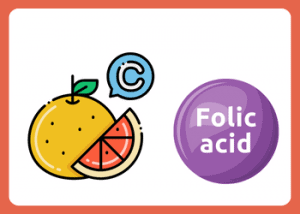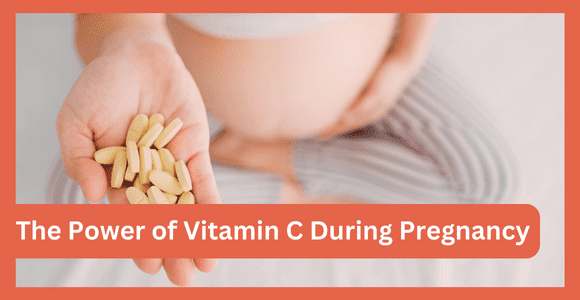During pregnancy, it is important to obtain adequate amounts of essential nutrients to support the health of both the mother and the developing fetus. Vitamin C is one such nutrient that plays a crucial role in various aspects of pregnancy, from boosting the immune system to aiding in collagen synthesis.
While a healthy and balanced diet is the best way to obtain vitamin C, some women may benefit from taking vitamin C supplements to ensure they are meeting their daily requirements. In this article, we will explore the power of vitamin C during pregnancy and discuss the benefits of supplementing with this essential nutrient.
Table of Contents
Why You Need Vitamin C During Pregnancy
Vitamin C is essential during pregnancy for several reasons. Firstly, it supports the immune system and helps to protect both the mother and fetus from infections and illnesses. Secondly, it plays a crucial role in collagen synthesis, which is necessary for healthy skin, bones, and connective tissues.
An essential part of sustaining a healthy pregnancy is ensuring that expecting mothers have adequate amounts of vitamin C.
This nutrient assists in the absorption of iron found in plant-based foods, an element that helps fight off anemia a common complication during pregnancy.
 Therefore, it is imperative to consume enough dietary sources or supplements containing this vital vitamin for maternal wellness and safety.
Therefore, it is imperative to consume enough dietary sources or supplements containing this vital vitamin for maternal wellness and safety.
Is Vitamin C with Zinc Safe for Pregnant?
Vitamin C with zinc is generally considered safe for pregnant women in recommended doses.
Zinc is an essential nutrient that supports the immune system, aids in wound healing, and helps with fetal growth and development.
However, pregnant women should consult with their healthcare provider before taking any vitamin C with zinc supplements to ensure that the dosage is appropriate and to avoid any potential interactions with other medications or supplements.
How Much Vitamin C Do Pregnant Women Need?
During pregnancy, it is recommended that women consume 85 milligrams of vitamin C daily – slightly more than the normal recommendation for non-pregnant individuals.
However, some healthcare providers may suggest greater dosages to pregnant women who are at risk of deficiency due to smoking or poor nutrition from limited fruit and vegetable consumption.
To ensure that your body is obtaining the correct amount of vitamin C, it’s recommended to maintain a healthy diet with abundant fruits and vegetables. Expecting mothers should seek guidance from their healthcare provider in order to determine how much vitamin C they need for optimal health during this life-changing time.
Benefits of Vitamin c During Pregnancy
- Boosts the immune system and helps prevent infections and illnesses
- Aids in the absorption of iron from plant-based foods, reducing the risk of anemia
- Supports healthy skin, bones, and connective tissues through collagen synthesis
- May reduce the risk of pre-eclampsia, a serious pregnancy complication
- Helps protect against damage from free radicals, which can harm fetal development
- Promotes healthy brain development and cognitive function in the developing fetus
- May reduce the risk of preterm birth and low birth weight
- Supports healthy placental development and function
- Helps to prevent stretch marks by promoting healthy skin elasticity.
Side Effects of Vitamin С in Pregnancy
- High doses of vitamin C may cause gastrointestinal discomforts such as diarrhea, nausea, and stomach cramps
- Excessive consumption can increase the risk of kidney stones
- High dosages can interfere with the body’s ability to absorb copper, a mineral necessary for fetal development
- Vitamin C supplements containing bioflavonoids may interact with some medications, including blood thinners and chemotherapy drugs. Pregnant women should always consult with their healthcare provider before taking supplements to avoid potential side effects and interactions with other medications or supplements.
Folic Acid and Vitamin C During Pregnancy
Folic acid and vitamin C are essential nutrients that have a significant effect on pregnancy. Folic acid, which is a B vitamin, aids in the formation of the neural tube – this eventually forms into the baby’s brain and spinal cord.
 Taking enough folic acid before and during your pregnancy will significantly reduce your chance of giving birth to an infant with neural tube defects.
Taking enough folic acid before and during your pregnancy will significantly reduce your chance of giving birth to an infant with neural tube defects.
In contrast, Vitamin C is a powerful antioxidant that assists in the absorption of iron and reinforces the immune system.
Expecting mothers need more Vitamin C than non-pregnant women to assist with their baby’s growth and development.
Here are some specific facts about the benefits of folic acid and vitamin C during pregnancy:
Folic Acid:
- The recommended daily intake of folic acid during pregnancy is 600 micrograms per day.
- Folic acid supplementation before and during early pregnancy can reduce the risk of neural tube defects by up to 70%.
- In addition to its role in neural tube formation, folic acid also helps in the production of red blood cells and DNA synthesis.
- Folic acid can be obtained from food sources such as leafy greens, fortified cereals, and legumes.
Vitamin C:
- The recommended daily intake of vitamin C during pregnancy is 85 milligrams per day.
- Vitamin C helps in the absorption of non-heme iron, which is important for the formation of red blood cells and oxygen delivery to the fetus.
- Adequate intake of vitamin C can also support the immune system of both the mother and the baby.
Good sources of vitamin C include citrus fruits, kiwi, strawberries, and tomatoes.
All in all, pregnant women must ensure they are getting enough folic acid and vitamin C through their diet as these nutrients play a key role in having a healthy pregnancy.
It is recommended to get the daily suggested intake from both food sources and dietary supplements if needed.
Frequently Asked Questions
Can You Take Vitamin C While Pregnant?
Absolutely! Vitamin C is a critical nutrient for both the expecting mother and her unborn child, so pregnant women should be sure to incorporate it into their daily routine.
How Does Vitamin C Affect the Baby While Pregnant?
While expecting, vitamin C is essential for you and your little one. It not only helps with tissue repair and wound healing, but also plays a role in the formation of bones, teeth, and collagen production in your body. Additionally, this nutrient strengthens immunity levels while simultaneously supporting iron absorption as well.
Can Too Much Vitamin C Hurt a Pregnancy?
It’s suggested that expecting mothers consume 120 mg of Vitamin C a day. Adults should not go beyond 2,000 mg in one single day. Although it is unlikely to be damaging when you have too much dietary vitamin C intake, large quantities from supplementing this nutrient can lead to diarrhea and other symptoms or illnesses.
Can a Pregnant Woman Take Vitamin C 1000mg?
A total of 15 studies found that ingesting a daily dosage of 1000mg of Vitamin C, either in isolation or combined with other supplements such as Vitamin E, did not lead to any improved outcomes for pregnant women and their babies.
Why Can’t I Take Airborne While Pregnant?
Expectant mothers should take caution before consuming Airborne or any other supplements high in vitamin A unless they have consulted their healthcare provider first; as an overabundance of this vitamin can be detrimental to the development of a fetus.
Can You Take Emergen-C While Pregnant or Nursing?
In general, it is advisable for pregnant and nursing individuals to exercise caution when considering the use of Emergen-C or any vitamin supplement, and it is crucial to consult with a healthcare professional before incorporating such products into their routine.
Emergen-C is a popular vitamin C supplement that typically includes additional vitamins and minerals. While vitamin C is generally recognized as safe during pregnancy and lactation, the additional components in Emergen-C should be scrutinized. Some formulations may contain higher doses of certain vitamins and minerals, which could exceed the recommended daily allowances for pregnant or breastfeeding individuals.
Excessive intake of certain vitamins and minerals during pregnancy can have adverse effects on fetal development. For instance, excessive amounts of vitamin A, D, or certain minerals can pose risks to both the mother and the developing baby. Therefore, it is crucial to choose supplements that are specifically formulated for use during pregnancy and nursing and to adhere to recommended dosages.
Moreover, individual health conditions and dietary considerations should be taken into account. Women with specific medical conditions or dietary restrictions may have different nutritional needs during pregnancy and lactation, and a healthcare professional can provide personalized advice based on their health status.
In conclusion, while vitamin C is generally safe during pregnancy and nursing, it is essential for individuals to consult with their healthcare provider before taking Emergen-C or any other supplement. A healthcare professional can assess individual health needs, provide tailored recommendations, and ensure the safety of both the mother and the developing baby.
Conclusion
Vitamin C is not only beneficial for supporting a healthy immune system but can also provide extra relief to pregnant women.
Not only is it safe and necessary both for the mom-to-be and the baby, but taking Vitamin C during pregnancy offers many benefits such as helping in the development of the fetus’s bones and teeth. Plus, vitamin C helps with iron absorption which makes sure the mother has enough energy throughout her pregnancy.
Eating right and taking prenatal vitamins are typically enough to satisfy your body’s Vitamin C needs during pregnancy. However, as with any new medications or supplements you’re thinking of trying while expecting a baby, it’s wise to consult your healthcare provider first.
